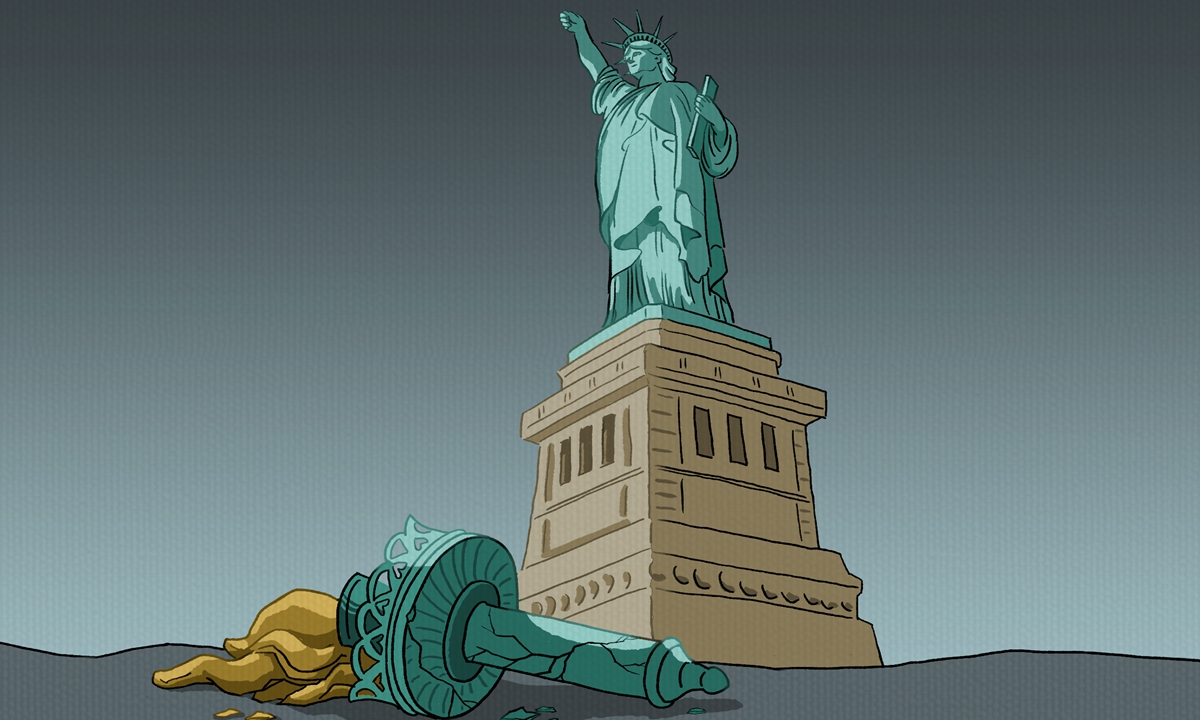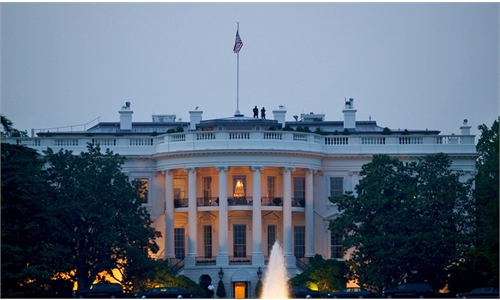
Illustration: Liu Rui/GT
On November 3, the world's oldest continuous democracy still in existence, the US, will hold not only presidential elections, but also vote for representatives for both houses of Congress.
This is a fine time to take a closer look under the hood and see how democratic the US still really is.
In the Democracy Index, published yearly by the reputable Economist magazine, the US ranks only 25th, categorized as a "flawed democracy." This places the country solidly behind "full democracies" in central Europe, and also Costa Rica or Uruguay, and very far from leading Scandinavian countries or Switzerland. Instead, the US is comparable to some countries with little democratic traditions like South Korea or South Africa.
Let's look at some of the flaws a German who lived for years in the US.
Some issues like the "winner takes it all" elector system are as old as the Constitution. This in another reality that outgrew the founding fathers' vision based on 13 small states. But most critical of all today, are the deliberate political attempts to discard the people's will.
"One person one vote" is only on the surface.
Rules differ widely by state who can vote, including how difficult voter registration is and if convicted felons can vote (a significant 8 percent of US' population).
The majority voting system, where one party gets all electoral votes of a state, explains why 2016 Democratic nominee Hillary Clinton could get almost 3 million more votes than US President Donald Trump and still lost. Slim margins are the norm in so-called swing states. In 2000, Florida was the state that determined the winner of the presidential election. Former US president George W. Bush won Florida with 537 votes out of almost 6 million cast, a margin of 0.009 percent, giving him the decisive 25 of total 270 electoral votes needed, while then-Democratic vice president Al Gore also received about 3 million ballot cast but got 0 vote.
Next, the electoral votes don't strictly correspond to the population, eligible voters or cast ballots. A vote in one state like Wyoming can be worth 3.6 times more than in California.
Even worse, politicians from both sides try to manipulate the system where they can.
"Gerrymandering," the practice of setting boundaries of electoral districts to favor specific political interests within legislative bodies, basically deliberately repeats the issue with popular vs electoral votes on the national level now within each state: The ruling state government cuts the state into absurdly odd-shaped districts. They concentrate the opponent's voters in few districts they then lose with a huge margin, but win all other districts with a safe margin. More seats for less votes.
With even more radical voter suppression, Republicans excel. In March, when it became clear that COVID-19 pandemic might endanger in-person voting, Democrats pushed for funding for early voting and mail in voting possibilities. Trump rejected it, saying this would lead to: "…. levels of voting that if you'd ever agree to it, you'd never have a Republican elected in this country again." Instead, he named a new postmaster general, who cut costs, removed letter boxes and sorting machines.
So there you have it, directly from the very top: less democracy is better, if the "right" people only manage to actually vote.
In September, the Wisconsin Supreme Court weighed whether to go along with conservatives who argue that 130,000 voters should be removed from the rolls in the swing state, only to make re-registering more difficult. The US does not have a national ID system. Usually state driver's licenses are used. So some states closed the offices issuing them.
Voter turnout is consequently low at around 50 to 60 percent in years with presidential elections. Those who never or just sometimes vote tend to be non-white, lower income, young, with low education.
Social media data combined with AI allows for targeting of single voters today. Many Americans are little informed and passionate about most political topics. Traditionally, all that counts are abortion and gun control. It's why only two parties with entrenched voters dominate US politics.
Occasionally, additional issues gain center stage, such as race tensions, healthcare or economic hardship and a polarizing candidate. In 2020 all these come together, but the expected record turnout is also estimated at only about two thirds of eligible voters. We will see how this looks as new numbers emerge for this year.
Those who do vote are increasingly informed by social media. Spreading ever more outrageous lies vs self-censorship and fact checking endangers freedom of speech, an essential ingredient of democracy. The president himself set the benchmark for how to abuse that right to spread misinformation and stoke hatred with social media.
Finally, election promises to voters are broken easily with no direct consequences.
After the elections, we will learn if all those grave defects of the US democracy are not small compared to what comes next. The US democracy could be tested like never before.
The author is founder and managing director of market research and consulting company Débrouillage Ltd. opinion@globaltimes.com.cn

